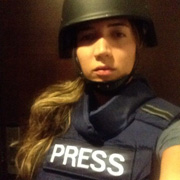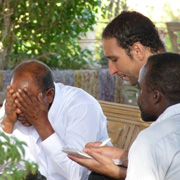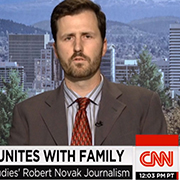
As a student of the TFAS European Journalism Institute (EJI) program, Muhammad Mansour (EJI 09) couldn’t help but draw parallels between his native Egypt and Prague as a city before it transitioned away from communism.
“After I was in Prague, I saw Egypt from a different perspective because I saw another culture. I saw both were beautiful cities with beautiful architecture. The Czech Republic went through a similar experience as Egypt, trying to be more free,” Mansour said.
When Mansour returned to Egypt after the EJI program, things began to change drastically as a revolution seeded, leading up the 2011 overthrow of former Egyptian President Hosni Mubarak. Mansour worked as a journalist and foreign correspondent, writing about the Mubarak overthrow and successive powers in Egypt for the last three years.
He did investigative reporting and published stories on war crimes and human rights abuses with outlets such as The Washington Post, the Guardian and the Egyptian Independent.

“Investigative reporting during a conflict is very difficult. You have lots of people telling you information, and you have to use your common sense to make sure this information is correct,” Mansour said.
Mansour reported on a leaked document that disclosed facts about the disappearance of more than 1,000 people during the revolution, allegedly at the hands of Egypt’s armed forces.
After reporting on the disappearances, the Raba massacre and underground secret military prisons, Mansour began to fear for his safety in post-revolution Egypt.
“I was very worried during this time because I knew journalists were being arrested and killed,” Mansour said. “I did much more work than some of these other journalists. If you compared our work, I should have been executed in public from their perspective.”
In spring 2014, Mansour applied for asylum in the United States. Despite the terror he witnessed during the revolution and fear of persecution as a journalist, he is hopeful about the future of Egypt.
“The new generation, people who lived through the revolution will be more exposed to other cultures. These people will change the country,” he said.

Tom A. Peter (Novak 13), Robert Novak Journalism Fellowship Program and Freelance Reporter
After studying abroad in Egypt as a college student, Tom A. Peter (Novak 13) knew he wanted to move back to the Middle East and report. After graduation, he moved to the West Bank, and his career took off on a whirlwind that lead him to work in Syria, Iraq, Afghanistan, the West Bank, Qatar, Jordan and Kuwait. His work has been widely recognized and published by outlets such as The Christian Science Monitor, Al Jazeera, the New Republic, USA Today and more.
Peter’s work earned him a prestigious fellowship with the TFAS Robert Novak Journalism Fellowship Program. Currently Peter is completing work on his Novak fellowship, reporting from the American Southwest border on how policies after Sept. 11 have affected the U.S. approach to border security and immigration.
Peter said that fellowships, such as the Robert Novak Journalism Fellowship, are increasingly critical to keep solid, independent reporting viable.
“The Novak Program is a great opportunity. Particularly with all these issues with freelancing, the Novak Program is more important than ever,” Peter said. “Fellowships can be a stopgap for the industry and make sure reporters are adequately funded and supported while they’re out reporting.”
After years of conflict reporting, Peter has been an outspoken advocate for better working conditions for foreign correspondents, especially in the light of the murders of American journalists James Foley and Steven Sotloff.
When his fellowship ends on Oct. 15, Peter said his location is to be determined. Although with his expertise and experience reporting on the Middle East, he believes he may be going abroad again.
“I’ve been able to live overseas and travel all over the world. Despite any frustration I could voice, I have traveled extensively and been at the center of world events. You can’t beat that,” Peter said.
Read more from Tom on his website: www.tomapeter.com.

